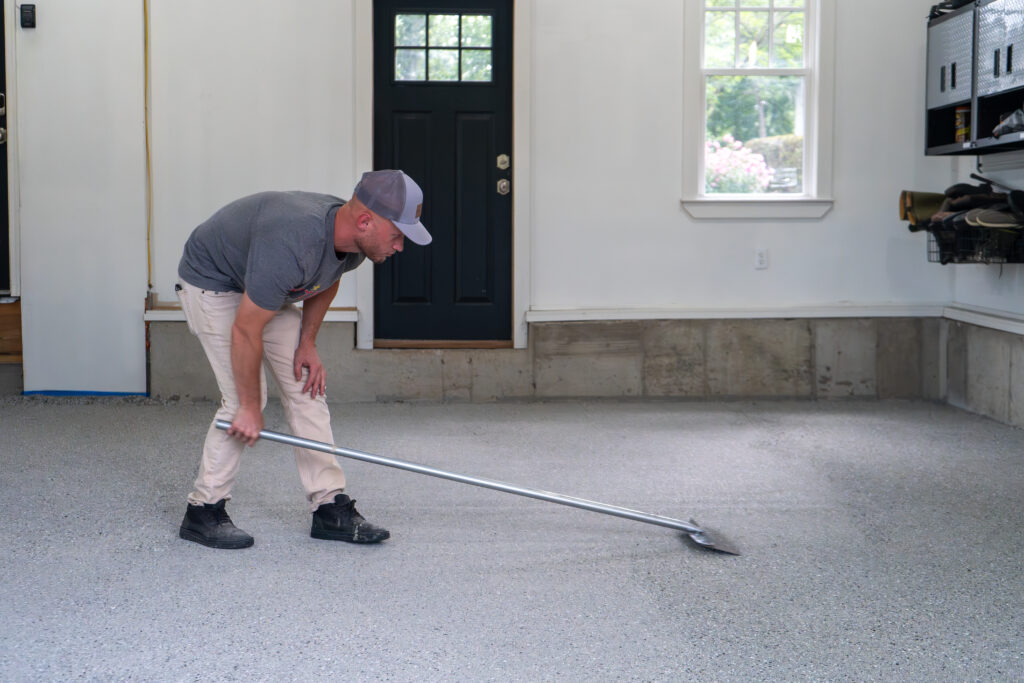Become an Installer

Starting an epoxy floor business scares many people. One fact is clear: knowing your expenses is key. Our guide on Epoxy Floor Business Start Up Cost will show you the ropes. Keep reading to learn more.
Initial Investment Breakdown
Starting an epoxy floor business requires a clear understanding of the initial investment needed. This breakdown includes costs for equipment, materials and supplies, plus training and certification to get you up and running effectively.
Equipment Costs
To start an epoxy floor business, you need to buy some equipment. High-quality grinders, mixers, and installation tools can cost from $1,500 to $2,000. This price range ensures you get durable and reliable gear for laying down flawless epoxy floors.
You also have to consider the vacuum system necessary for prepping surfaces, priced around $800 to $1,200. Materials like rollers and squeegees add extra expenses but are vital for a smooth application process. Investing in good quality materials from the beginning saves money long-term by reducing replacement costs.
Proper research helps find deals on bulk purchases or gently used equipment which can lower initial outlays significantly.

Materials and Supplies
Materials and supplies are the backbone of an epoxy floor business. You need high-quality epoxy resin, hardeners, and a variety of colors and finishes to meet customer demands. Buying in bulk can save money, but initial costs can be high.
For a basic setup, expect to spend several thousand dollars on these essential items. Keeping a well-stocked inventory is crucial for handling any project that comes your way.
Training and Certification
Training and certification are crucial steps for starting a successful epoxy floor business. Learning how to properly apply epoxy coatings and understanding the necessary safety measures ensures you’re prepared to deliver high-quality results to your clients.
Many courses offer both online and hands-on training options, ranging from a few days to several weeks, depending on the depth of knowledge you need. Certification often involves passing an exam to demonstrate your understanding of materials, application techniques, and safety protocols. This certification not only adds credibility to your business but also assures clients that they’re working with a qualified professional.
Consider signing up for a demo or training seminar from Optus Resin. Their events provide immersive, hands-on experiences covering advanced coating techniques, product knowledge, and practical applications for solutions like Floaterra, AquaScreed, and Pool P’aint. You’ll also learn critical industry skills, such as bidding on projects, assessing floor conditions, and creating stunning epoxy finishes.
| Training Program | Type | Duration | Cost | Key Features |
| Optus Resin Demo | Hands-On | 3 Days | Reach out for more info | Covers advanced techniques for various products. |
| Online Epoxy Course | Online | 1–2 Weeks | Upwards of $500 | Convenient, learn at your own pace. |
| In-Person Certification | Hands-On | 1–2 Weeks | $1,000–$2,000 | Practical, industry-recognized. |
Additional Expenses to Consider
Starting an epoxy floor business involves more than initial investments. You need to plan for marketing, licensing, and insurance costs too.
Marketing and Advertising
Marketing and advertising are key to growing your epoxy floor business. You need a solid plan to reach potential customers. Creating a website, printing business cards, and using social media can help spread the word about your services.
Think about investing in online ads too. These steps make it easier for people looking for garage floor epoxy or commercial epoxy flooring to find you.
Having special offers is another smart strategy. It attracts new clients and keeps existing ones coming back. Also, asking happy customers to leave reviews online builds trust with potential clients.
Consider partnering with a marketing agency to take your efforts to the next level. A professional team can help you craft a tailored strategy, optimize your online presence, and manage your advertising campaigns for maximum impact, allowing you to focus on delivering top-quality epoxy flooring services.
Business Licensing and Insurance
Getting your business license and insurance for an epoxy floor coating startup needs attention. Every state has different rules for issuing business licenses. You must check with local authorities to get the right permits.
This process ensures your business operates legally. For insurance, start by getting general liability insurance. This covers accidents or damage at work sites. Many clients ask for proof of insurance before hiring you.
Insurance costs vary based on coverage levels and location. Shop around to find the best rates and coverage for your needs. Having these in place protects your business financially and builds trust with customers.
| Category | Estimated Cost Range | Notes |
|---|---|---|
| Equipment (Grinders, Mixers, Tools) | $1,500–$2,000 | Invest in durable, reliable equipment. |
| Vacuum System | $800–$1,200 | Essential for surface prep. |
| Materials and Supplies | $2,000–$5,000 | Includes resin, hardeners, finishes. |
| Training and Certification | $500–$2,000 | Prices vary based on program depth. |
| Marketing and Advertising | $500–$3,000 | Website, social media, online ads, etc. |
Conclusion
Kicking off an epoxy floor business requires careful budget planning. Initial costs cover equipment, materials, and getting the right training. Don’t overlook ongoing expenses like marketing and insurance to keep the business running smoothly.
This guide serves as a useful starting point for anyone looking to enter the epoxy flooring industry with clear eyes on investment needs and profitability potential.

